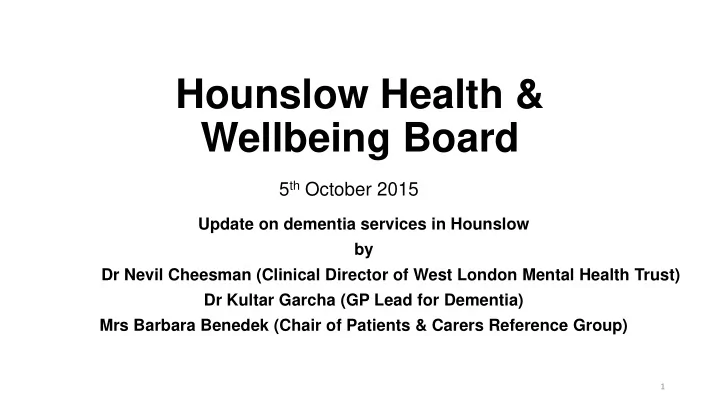

Hounslow Health & Wellbeing Board 5 th October 2015 Update on dementia services in Hounslow by Dr Nevil Cheesman (Clinical Director of West London Mental Health Trust) Dr Kultar Garcha (GP Lead for Dementia) Mrs Barbara Benedek (Chair of Patients & Carers Reference Group) 1
Background Information The prevalence of people with Dementia in the Borough is approximately 1,800. The main services are provided by: 1. West London Mental Health Trust (WLMHT) Cognitive Impairment and Dementia Services. 2. Hounslow Dementia Liaison Nurses who are part of the WLMHT Psychiatric Liaison Service. 3. Alzheimer's Society who provide a Dementia Advisor, facilitate a Service User group as well as short breaks for carers. 2
Hounslow Cognitive Impairment and Dementia Service Dr Nevil Cheesman Clinical Director for CIDS West London Mental Health Trust 3
Current Service CIDS Service • WLMHT is the main provider of clinical services for people with Dementia. • Community Teams in Hammersmith, Hounslow, Ealing East and Ealing West. • In patient Services – Jubilee and Limes. • Community Teams • Assessment and diagnosis • Post-diagnostic support • Crisis support • Monitoring of high risk patients • Monitoring of patients on cholinesterase inhibitors 4
Business Case Currently implementing a business case with funding from Hounslow CCG. Benefits:- 1. Improved integration across secondary care, third sector and primary care by developing a primary care link worker role. 2. Improvement in quality of care for patients throughout their illness including preventative work to help longer, independent living. 3. Increased support for carers. 4. Increased access to post-diagnostic support. 5
5. Clearly defined pathway for BPSD support. 6. Increased specialist dementia home care (Local Authority or Continuing Care nursing home) to reflect improved quality, choice and control for the patient. 7. Improved coordination and delivery of end-of-life care. 6
The Primary Link Worker will: • Be responsible for the management of a defined caseload as a key named worker for the person with dementia and their carer. • Where appropriate assist people by providing information on how to obtain a diagnosis and by co-ordinating support to enable people to attend assessments and medical appointments. • Provide relevant support and information to GP networks/surgeries and Care Co-ordinators to reduce inappropriate referrals made to WLMHT. • Carry out home assessments to identify the social and health care needs of people with dementia and their carers during the whole period of the illness. 7
• Provide information and signposting to people with dementia and their carers and work with them so that they can have choice and control over their care plans. • Provide support to people with dementia and their carers who are finding barriers to accessing services and to help them navigate these services. • Be responsible for carrying out six-monthly reviews of people with dementia on cholinesterase inhibitors and update GPs on this. • Refer back to CIDS e.g. for medication issues and behavioural problems relating to dementia and inform the GP or Care Co- ordinator of referral. • Liaise with Social Services, GPs, WLMHT staff and other health and social care professionals so that appropriate additional services are provided for both people with dementia and their carers. 8
Hounslow Dementia Steering Group Dr Kultar Garcha • Key individuals from primary care, secondary care, social care and voluntary sector • Focus on post diagnostic support • those with dementia and also carers • Help develop new initiatives and advise on pre-existing ones • Help implement the CIDS business case • Work on improving the communication between all the service providers 9
Stages of grief Mrs Barbara Benedek • Denial • Anger • Bargaining • Depression • Acceptance + frustrations and difficulties of caring for someone with dementia 10
Speech therapist Urologist Incontinence nurse Geriatrician Our life Out of hours GP House Community dentist Bills GP Travel Cooking Dementia Find and manage Carer’s Family Consultant personal care team! assessment Garden Carers’ Having fun OT support Friends group Where are Physio social services? Mick and Manage Barbara medication Travel insurance Financial Can we afford advice Legal advice this? District nurse Adaptations to our house With thanks to Activities - Barbara and Wheelchair service Malcolm Pointon having stuff Integrated response team to do Mattress technician Equipment service 11
Thank you Any Questions 12
Recommend
More recommend